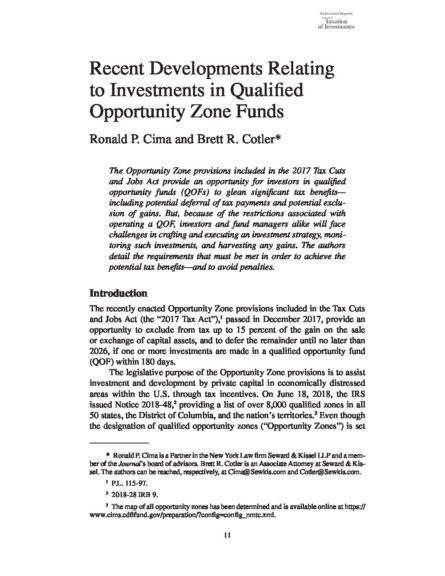
Recent Developments Relating to Investments in Qualified Opportunity Zone Funds
Tax Partner Ron Cima and Associate Brett Cotler published “Recent Developments Relating to Investments in Qualified Opportunity Zone Funds” in the Journal of Taxation of Investments. The Opportunity Zone provisions included in the 2017 Tax Cuts and Jobs Act provide an opportunity for investors in qualified opportunity funds (QOFs) to glean significant tax benefits — including potential deferral of tax payments and potential exclusion of gains. But, because of the restrictions associated with operating a QOF, investors and fund managers alike will face challenges in crafting and executing an investment strategy, monitoring such investments, and harvesting any gains.
Article Abstract: The recently enacted Opportunity Zone provisions included in the Tax Cuts and Jobs Act (the “2017 Tax Act”), passed in December 2017, provide an opportunity to exclude from tax up to 15 percent of the gain on the sale or exchange of capital assets, and to defer the remainder until no later than 2026, if one or more investments are made in a qualified opportunity fund (QOF) within 180 days. The legislative purpose of the Opportunity Zone provisions is to assist investment and development by private capital in economically distressed areas within the U.S. through tax incentives. On June 18, 2018, the IRS issued Notice 2018-48, providing a list of over 8,000 qualified zones in all 50 states, the District of Columbia and the nation’s territories. Even though the designation of qualified opportunity zones (“Opportunity Zones”) is set to expire on December 31, 2028, a QOF will be treated as though the fund remained invested in Opportunity Zones (notwithstanding the geographic area’s loss of status as a qualified opportunity zone). Many QOF issues left unresolved by the 2017 Tax Act were addressed by proposed Treasury Regulations (the “Proposed Regulations”) that were issued in October 2018. The Proposed Regulations will not go into effect until they are adopted as final regulations, but the effective date provision provides that taxpayers may rely on the Proposed Regulations as long as the Proposed Regulations are applied in their entirety and in a consistent manner. The purpose of the effective date provision is to encourage taxpayers to invest in Opportunity Zones without waiting until final regulations are issued.
If you have any questions, please contact Mr. Cima or Mr. Cotler directly.